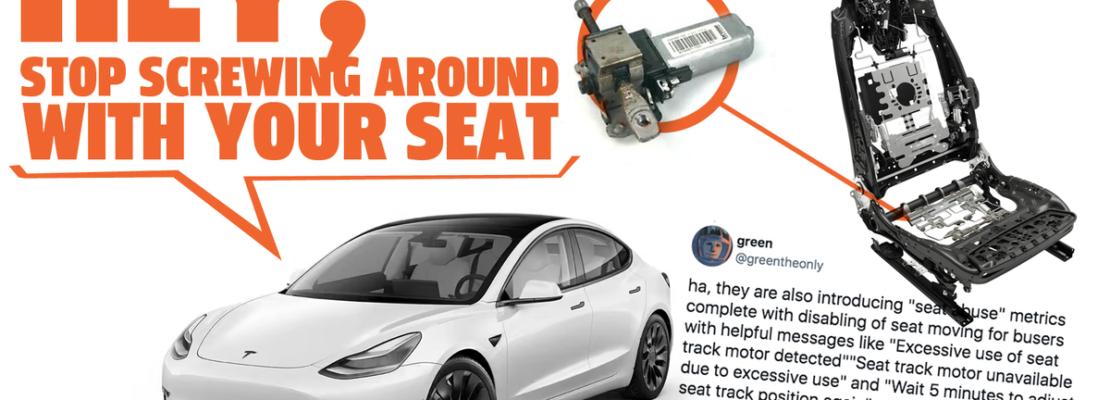We’ve reported on the findings of Tesla hacker/researcher GreenTheOnly before, and it seems that a new interesting detail has been discovered, found in relation to information about a new front seat vendor for Tesla Model 3 and Model Y cars. The cars appear to track metrics and data about how often the seat is adjusted, and “excessive use” can result in users being locked out of adjusting the seat. This sounds, um, annoying.
Here are the tweets where GreenTheOnly discusses the findings:
ha, they are also introducing "seat abuse" metrics complete with disabling of seat moving for busers with helpful messages like "Excessive use of seat track motor detected""Seat track motor unavailable due to excessive use" and "Wait 5 minutes to adjust seat track position again"
— green (@greentheonly) January 27, 2022
That new supplier, Brose, is a major seat and seat control system provider to OEMs, and Brose-developed or co-developed seats are used by Volkswagen, Hyundai, and many others. Hell, according to some sources, a full half of new cars sold worldwide use Brose electric motors or seat components.
I mention this because it’s not like Brose is new at this. They’re extremely well established, and so far I can’t think of any new car out there that limits the use of their seat adjustment motors, a significant number of which use Brose-built components.
Here’s a bit more detail on the “seat abuse metrics”:
and you get the warning and on any more use the motor is disabled for 5 minutes to be sure there's no untracked "abuse". It's not yet clear what the size of the buffer is.
— green (@greentheonly) January 31, 2022

The motors in question appear to be the ones just for the fore-aft seat track control, not lumbar support. At least not yet.
So, ok, according to these findings, screwing with the seat for 90 seconds inside of five minutes gets you a warning, adjusting the seat for two minutes inside of five minutes gets you disabled for the next five minutes, and if you just do a lot of “short bursts,” you get cut off for five minutes, too. But that last use case is a bit confusing — is the buffer overflow due to a bug, or is it a way to prevent “untracked abuse?
I’m not sure, but it is all a bit strange. Sure, it’s easy to imagine a kid going to town on the seat controls. Hell, I’ve not just seen it happen, I’m pretty sure I’ve done it myself on many cars, starting with my parents’ old 1973 Ford Country Squire.
And, sure, while that car had burned out window motors after a few years, the seat motors never broke. I don’t usually think of burned-out seat motors as a huge issue, though I know it can happen. Those motors don’t get a lot of ventilation, and I’m sure they can overheat.
Still, this is the first time I’ve ever heard of a built-in safeguard for the motors, and I’m pretty conflicted.
Is this a good idea, in that it’ll keep you from burning out your seat motors? Or is it just going to be wildly annoying, possibly even dangerous, if you’re driving and don’t have a well-adjusted seat that you’re trying to correct?
I know being locked out of my own seat controls would be deeply frustrating and make me want to pull trim pieces off the interior in a mild, fussy rage. This feels a lot like the sort of thing that would reinforce my love of old shitboxes that would just burn out their seat motors — in the unlikely event they had them — in a puff of smoke and dignity, instead of scolding you to quit playing with your seat like a cranky substitute teacher who doesn’t know you have reasons and Mrs. Planktonsalad always lets you adjust your chair.
Is this just pre-emptive cost saving on possible warranty claims? Are they trying to get away with using cheaper, lower-spec motors? Just a power trip?
I’d ask Tesla, but, of course, they DGAF and have farmed out their U.S. PR efforts to memes and encouraging superfans or whatever.
I’ll be curious to see how this type of extra car-control monitoring and policing plays out in the real world. I suspect most people will hate it. If it helps save motors from repair, great, though I’m still not convinced these motors actually are a significant issue in the industry.
I guess we’ll see?









